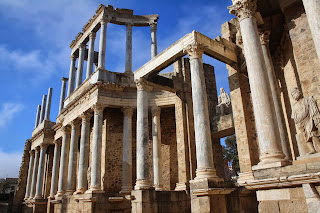 There
was one more city to visit before Madrid. I
had considered crossing eastwards to Valenica or even going over the
border into Portugal. In the end, I decided to keep things simpler
and start making my way inland. From Cádiz, I journeyed 300km north to the Extremaduran capital of Mérida, where there was added
incentive to stop and explore.
There
was one more city to visit before Madrid. I
had considered crossing eastwards to Valenica or even going over the
border into Portugal. In the end, I decided to keep things simpler
and start making my way inland. From Cádiz, I journeyed 300km north to the Extremaduran capital of Mérida, where there was added
incentive to stop and explore.
Since
telling my parents of my trip to Spain, they had been tirelessly
reminding me that I have a cousin in Mérida. But this wasn't someone
I had spent Sunday afternoons with in childhood. Frances was
raised in London by my father's oldest sister and her English
husband, who, I will always remember, had once told me about living
through the Blitz. Despite being first cousins, circumstances meant simply that we had never met.
Nevertheless
I decided, with relentless encouragement from my father, that I would
try and make contact with him. But upon reaching only a Spanish lady
who didn't seem to speak English, I thought I had been given the
wrong phone number. Tired and uncertain, I went to a nearby bar and
tried to order a tapa of goat's cheese, only to end up with a full
plate of salad.
The
next morning, I tried the same number and was relieved to hear Frances complimenting my "brave attempt" to ask if it was right. It was, in fact, a babysitter I'd been talking to the night before. Upon
first meeting, Frances confirmed that I indeed had the “head of a
Tobin”. His own resemblance to his father was equally faithful.
Frances' marriage to fellow Londoner Rupee in the summer of 1995 had actually been the cause of my first
trip out of Ireland. While my parents attended, my older brother and
I stayed with my Gran Aunt in her London apartment. I recall her
talking about how Real Zaragoza midfielder Nayim had defeated her
beloved Arsenal with that audacious lob over David Seaman in the 1995 Cup Winners' Cup Final.
In the meantime, Frances and Rupee had two children of their own. On meeting them, the younger daughter turned anxiously to her mother and commented: "I don't know Mum, he's a bit big". Afterwards,
Frances took me to see the Roman ruins that Mérida is famous for. They were just as compelling as anything I
had seen in Moorish Andalusia.
That afternoon and evening, I was treated to amounts of food
probably sufficient until I get home. In between were conversational
insights into Spanish society that I could have never incurred on my
own or in hostels. Spending time with my cousin and his family turned out to be biggest education of my whole Spanish adventure.




.JPG)


